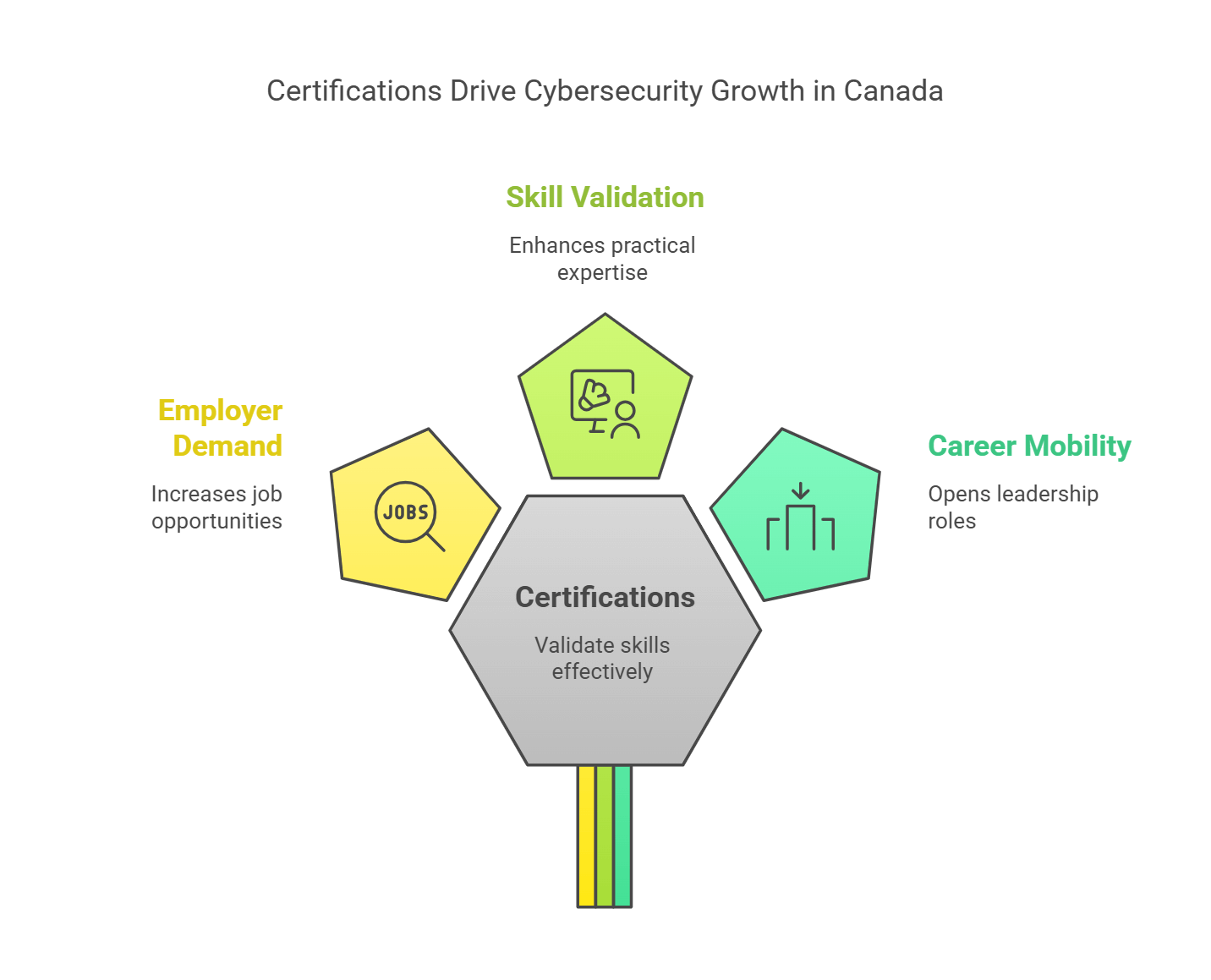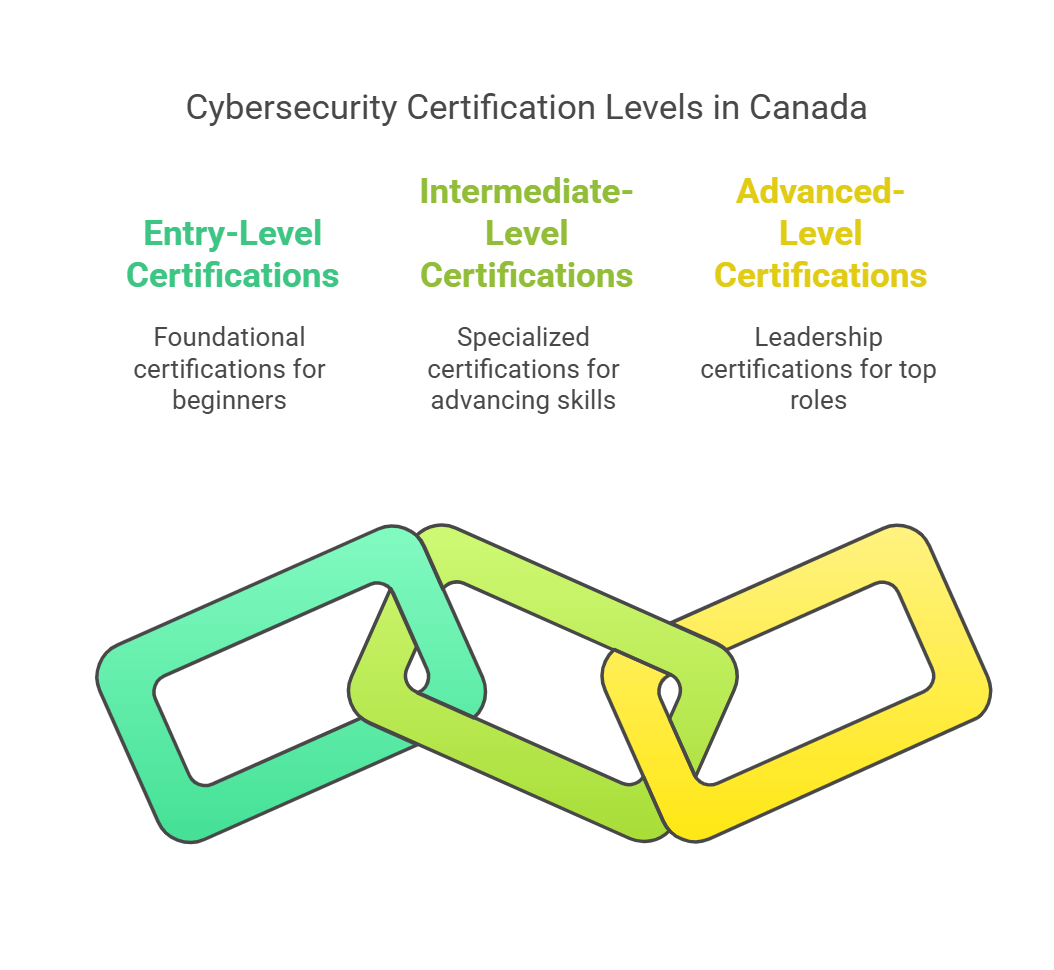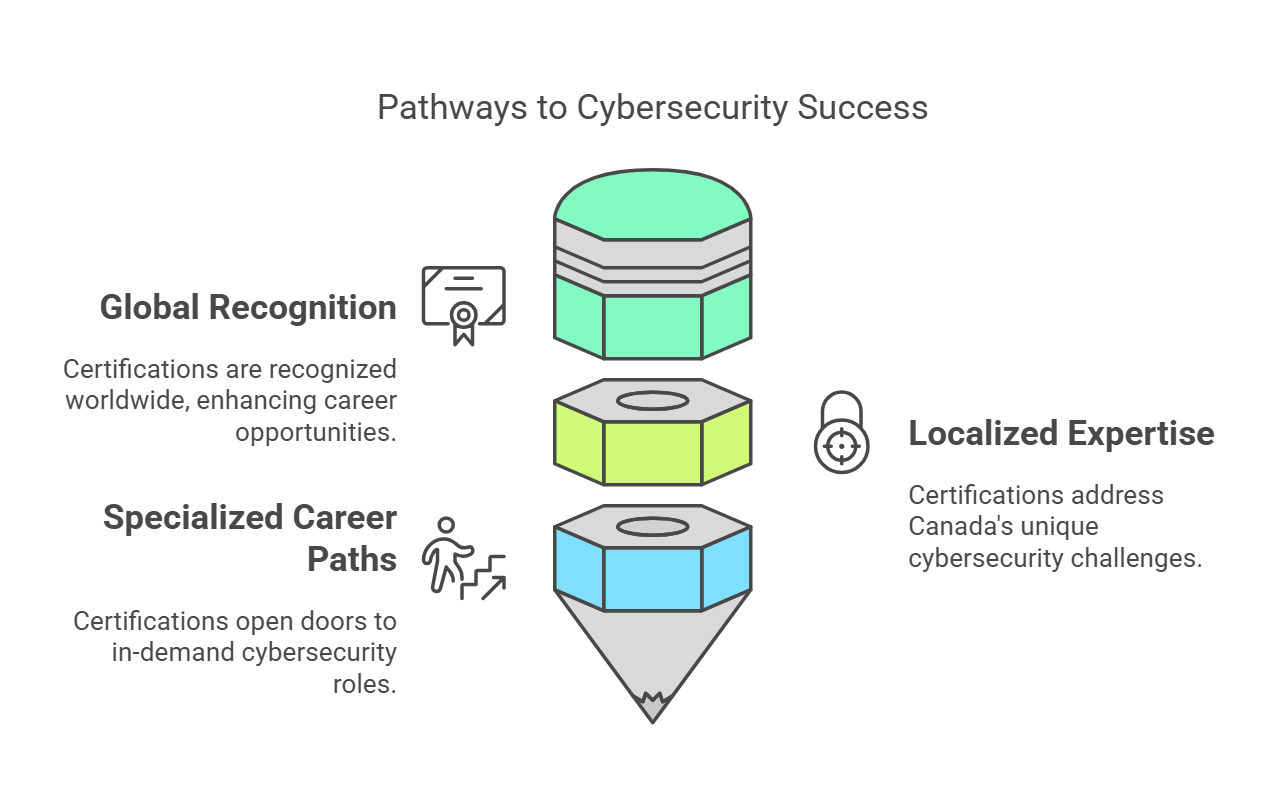Table of Contents
Cybersecurity is a critical need in Canada’s rapidly digitizing economy. With industries from finance to healthcare increasingly reliant on secure, digital infrastructures, the demand for qualified professionals has never been higher. For those looking to solidify their expertise, the cybersecurity certification course provides a proven pathway to success. In 2025, the need for skilled cybersecurity experts continues to rise, with new threats emerging every day.
Why Get Cybersecurity Certification in Canada in 2025?
Canada ranks among the top nations in digital innovation and cybersecurity adoption. Businesses and government organizations alike are pouring investments into mitigating cyber risks, creating a growing demand for skilled professionals with the right certifications. Here’s why investing in certifications matters in the Canadian market, especially in 2025:

Employer Demand
From tech giants to public sector institutions, Canadian employers prioritize candidates with verifiable skills. Certifications act as a stamp of approval, proving you’re capable of addressing complex cyber threats. In 2025, an increasing number of job postings, such as those seen in Google Search Console queries like “top cybersecurity certifications Canada 2025”, reflect how certifications are becoming non-negotiable for top-tier positions in cybersecurity.
Skill Validation
Cybersecurity certifications not only advance theoretical knowledge but also prepare you with hands-on expertise, which is essential for tackling real-world challenges. The emphasis on practical training has made certifications like CompTIA Security+ and Certified Ethical Hacker (CEH) more popular than ever in 2025. Google search trends like “best cybersecurity certification programs in Canada 2025” highlight the continued demand for these certifications.
Career Mobility
With certifications aligned to global standards, opportunities open up both in Canada and internationally. Plus, high-level certifications make you an attractive candidate for leadership roles. In 2025, certifications such as CISSP and CCISO are critical for those looking to step into executive cybersecurity positions, as seen in growing searches like “executive cybersecurity certifications Canada 2025”.
Exploring the Cybersecurity Certification in Canada Hierarchy
The cybersecurity certification in Canada structure follows a clear hierarchy to suit professionals at various stages of their careers. Certifications are generally categorized into three levels:

1. Entry-Level Certifications
These certifications cater to those just starting out in cybersecurity, offering foundational knowledge needed to lay a strong career base.
Popular Entry-Level Certifications in Canada:
-
CompTIA Security+: Globally regarded as an essential starter certification, covering the basics of security protocols and risk mitigation.
-
Cisco Certified CyberOps Associate: Focuses on the fundamentals of cybersecurity and operations needed to manage SOC (Security Operations Center) responsibilities.
Benefits of Entry-Level Certifications:
-
Build basic skills in cyber defense, network security, and threat management.
-
Ideal for roles like Cybersecurity Technician or Junior SOC Analyst.
Google Search Console queries like “entry-level cybersecurity certifications in Canada 2025” reveal how many individuals are seeking these foundational programs to break into the field.
2. Intermediate-Level Certifications
Intermediate-level certifications are perfect for those who have established a foundation and are looking to specialize in specific areas of cybersecurity.
Top Picks in Canada:
-
Certified Ethical Hacker (CEH): Learn how to think like a hacker and actively defend against cyber attacks.
-
Certified Cloud Security Professional (CCSP): Designed for experts focusing on cloud security—a growing field in Canada, given the rise of cloud adoption post-COVID-19.
Benefits of Intermediate Certifications:
-
Equips you for hands-on roles like Penetration Tester or Cloud Security Architect.
-
Helps in securing mid-level positions with salaries that reflect expertise.
In 2025, cloud security is a major area of growth, as indicated by increasing searches for “cloud security certifications Canada 2025”. The shift towards cloud infrastructures means that certifications in this area are becoming more crucial.
3. Advanced-Level Certifications
At the top rung of the cybersecurity certification hierarchy in Canada, advanced certifications are designed for leadership and specialized technical roles.
Leading Certifications in Canada:
-
Certified Information Systems Security Professional (CISSP): Globally recognized for senior roles requiring governance, regulation, and policy management expertise.
-
Certified Chief Information Security Officer (CCISO): Tailored to those managing the overall cybersecurity strategy of organizations.
Benefits of Advanced Certifications:
-
Positions you to lead cybersecurity strategies at the highest levels, such as CISO or Head of IT Security.
-
Associated with roles offering six-figure salaries, particularly in industries like banking and healthcare.
Google Search Console data, such as queries for “CISSP certification demand Canada 2025”, highlights that advanced certifications continue to be highly sought after in executive-level positions.
The ACSMI Advantage in Canada
When it comes to extensive and industry-relevant training, the ACSMI Certification reigns supreme in the cybersecurity world. Its unique structure makes it a clear choice for candidates in Canada who want a certification that covers every aspect of this fast-evolving field. In 2025, ACSMI’s 400-module cybersecurity certification remains a leading choice for professionals looking to enhance their careers.
Why Choose ACSMI?
-
Comprehensive Curriculum: With over 400 modules, the ACSMI certification dives deep into every realm of cybersecurity, from cryptography to GDPR compliance.
-
Practical Training: The program emphasizes real-life problem-solving through cutting-edge simulation labs that mirror modern-day security challenges.
-
Regional and Global Credibility: While globally recognized, ACSMI certification also tailors aspects of the training to meet regional needs, including Canada’s cyber landscape. In 2025, ACSMI continues to provide industry-leading education for Canadian professionals, preparing them for challenges in both local and global cybersecurity landscapes.
Benefits of Cybersecurity Certification in Canada

-
Global Recognition
Certifications earned in Canada are recognized worldwide, thanks to their alignment with rigorous international standards. This global credibility ensures that your qualifications hold weight both within Canada and across global markets. Whether you aim to build your career domestically or aspire to work abroad, a Canadian cybersecurity certification is a powerful stepping stone. Queries like “global recognition of Canadian cybersecurity certifications 2025” reflect the continuing demand for Canadian professionals in the international cybersecurity market. -
Localized Expertise
Canada’s cybersecurity landscape has unique challenges, from compliance with data privacy laws like PIPEDA to addressing evolving threats in key industries such as finance, healthcare, and retail. Many certification programs in Canada are designed to incorporate these specific regional needs. By earning these qualifications, you not only demonstrate a nuanced understanding of global standards but also prove your capability to meet industry-specific requirements that Canadian employers prioritize. -
Specialized Career Paths
Cybersecurity certifications unlock pathways to specialize in in-demand fields such as cyber threat intelligence, forensic analysis, or cloud engineering. These roles require a unique mix of theoretical knowledge and practical skills—both of which certifications deliver. As Canadian sectors increasingly adopt advanced technologies, your ability to step into specialized roles ensures not only better job prospects but also expanded career versatility in one of the country’s fastest-growing industries.
Final Words
Pursuing a cybersecurity certification in Canada is a game-changing move for those ready to stay ahead in this competitive industry. Certifications not only validate essential skills but also prepare you to meet real-world challenges—from protecting sensitive data to implementing proactive defense strategies. In 2025, cybersecurity remains one of the fastest-growing sectors globally, and Canada continues to be at the forefront of this evolution.
Take the time to evaluate where you stand in your career and pick the certification that aligns with your current standing, goals, and industry demands. Whether you’re starting with basics or exploring advanced specializations, programs like ACSMI ensure you’re equipped with skills that matter both in Canada and globally. Take the leap today and unlock the future of cybersecurity success!
Frequently Asked Questions (FAQs) About Cybersecurity Certification in Canada
What is the best entry-level cybersecurity certification in Canada?
Certifications like CompTIA Security+ or Cisco Certified CyberOps Associate are great for beginners, providing foundational cyber skills.
Is the ACSMI certification suitable for professionals in Canada?
Absolutely. With over 400 modules covering Canadian-specific needs and global requirements, ACSMI certification is perfect for professionals at all levels. Queries like “ACSMI cybersecurity certification Canada 2025” reflect the increasing demand for comprehensive cybersecurity training.
Can certifications boost my earning potential?
Yes, certified professionals in Canada earn significantly more than their uncertified peers—often upwards of 15-20% in extra pay for senior certifications like CISSP.
Are there certification programs that cater specifically to cloud security?
Yes. The Certified Cloud Security Professional (CCSP) is highly sought after by professionals working for Canadian organizations adopting cloud technologies.
How can I ensure my certification remains relevant?
Most certifications require renewals or continuing education (CPE credits). Stay updated with industry trends and regularly enhance your skills post-certification.

Leave a Reply